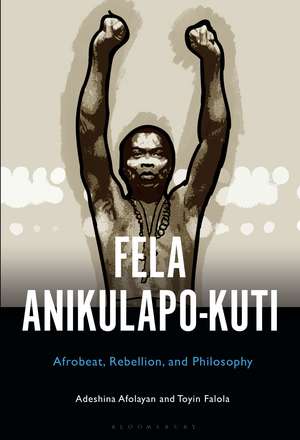Fela Anikulapo-Kuti: Afrobeat, Rebellion, and Philosophy
Autor Dr. Adeshina Afolayan, Dr. Toyin Falolaen Limba Engleză Paperback – 23 aug 2023
| Toate formatele și edițiile | Preț | Express |
|---|---|---|
| Paperback (1) | 192.64 lei 6-8 săpt. | |
| Bloomsbury Publishing – 23 aug 2023 | 192.64 lei 6-8 săpt. | |
| Hardback (1) | 570.02 lei 6-8 săpt. | |
| Bloomsbury Publishing – 9 feb 2022 | 570.02 lei 6-8 săpt. |
Preț: 192.64 lei
Preț vechi: 250.07 lei
-23% Nou
Puncte Express: 289
Preț estimativ în valută:
36.87€ • 40.07$ • 30.99£
36.87€ • 40.07$ • 30.99£
Carte tipărită la comandă
Livrare economică 22 aprilie-06 mai
Preluare comenzi: 021 569.72.76
Specificații
ISBN-13: 9781501374753
ISBN-10: 1501374753
Pagini: 288
Dimensiuni: 152 x 229 x 25 mm
Greutate: 0.4 kg
Editura: Bloomsbury Publishing
Colecția Bloomsbury Academic
Locul publicării:New York, United States
ISBN-10: 1501374753
Pagini: 288
Dimensiuni: 152 x 229 x 25 mm
Greutate: 0.4 kg
Editura: Bloomsbury Publishing
Colecția Bloomsbury Academic
Locul publicării:New York, United States
Caracteristici
Provides a unique perspective from which to appraise decolonization, and the liberation process in Africa
Notă biografică
Adeshina Afolayan is a senior lecturer of philosophy at University of Ibadan, Nigeria. His areas of specialization include African philosophy, political philosophy and cultural studies. He is the editor of Auteuring Nollywood (2014), author of Philosophy and National Development in Nigeria (2018), the coeditor of the Palgrave Handbook of African Philosophy (2017), and the coeditor of Pentecostalism and Politics in Africa (2018). Toyin Falola is the Jacob and Frances Sanger Mossiker Chair in the Humanities at the University of Texas at Austin, USA. He has several books to his credit, cutting across history, cultural studies, and African studies. Professor Falola holds 7 honorary doctorates, several prestigious lifetime career awards (including the Distinguished Africanist Award from the African Studies Association). A total of 9 Fetschriften have been written in his honour on the creation of the construction of the subaltern. He served as Vice President of UNESCO's International Scientific Committee, Slave Route Project from 2011 - 2015 and currently on the Carnegie African Diaspora Fellows Programme and the International Committee of the Thabo Mbeki African Leadership Institute at UNISA.
Cuprins
PrefaceIntroduction1. Fela Anikulapo-Kuti and Fela Studies2. Fela in Historical PerspectivesPart A History And Culture3. Natal Tales: Fela and His Family4. The Performative Rhythm: From Highlife to Afrobeat5. The "Woman Question": Fela and His Women Part B Fela, Art, and Politics6. Fela and Postcolonial Political Economy of Nigeria7. The Politics of Fela's Music8. Fela's Use of Language9. Postcoloniality and Art in Fela and His AfrobeatPart C Fela and Felasophy10. Cultural Imperatives in Fela's Music11. Fela's Thoughts on African Indigenous Knowledge Systems12. Fela and Pan-Africanism13. Blackism: Fela's Political Philosophy14. Freedom and Excesses: Fela and Social Eccentricities Part D Fela In The Future15. Post-Fela: Afrobeat as Memorialization16. Fela as a LegacyNotesBibliographyIndex
Recenzii
Fela will remain an enigma for generations to come. New and fresh studies about his "strange-beingness", and his illustrious career, even with all the controversies, will also continue to emerge. Afolayan and Falola provide deep insight on our subject while also making the text accessible, even to popular readers - Fela's primary constituency, whose struggles and experiences provided the bases for his life choices and framed the revolutionary contemplations in his body of works. The authors propose a forward-looking approach to the study of Fela's life, music, activism, and philosophy. Clearly, this is a book that deserves attention for things yet unsaid and even unknowable about 'Abami Eda', Fela!
This book offers a deep dive into the implications of Fela's political philosophy, including his personal relationships and the embodied intervention of Afrobeat music and dance itself. This important work succeeds in placing Fela where he truly belongs, among thinkers and revolutionaries such as Fanon, Malcolm X, Bob Marley, and Kwame Nkrumah.
This provocative and very readable book is the most rigorous and learned attempt yet to understand Fela not just as an artist, but as a political philosopher shaped by his time and place. As the musician's posthumous reputation continues to grow, Afolayan and Falola do not merely celebrate Fela and his concept of blackism, but also engage critically with his apparent blind spots and inconsistencies as a thinker and performer, particularly in matters of gender and sexuality. Stimulating reading for historians of pan-African thought as well as Fela enthusiasts.
This book offers a deep dive into the implications of Fela's political philosophy, including his personal relationships and the embodied intervention of Afrobeat music and dance itself. This important work succeeds in placing Fela where he truly belongs, among thinkers and revolutionaries such as Fanon, Malcolm X, Bob Marley, and Kwame Nkrumah.
This provocative and very readable book is the most rigorous and learned attempt yet to understand Fela not just as an artist, but as a political philosopher shaped by his time and place. As the musician's posthumous reputation continues to grow, Afolayan and Falola do not merely celebrate Fela and his concept of blackism, but also engage critically with his apparent blind spots and inconsistencies as a thinker and performer, particularly in matters of gender and sexuality. Stimulating reading for historians of pan-African thought as well as Fela enthusiasts.
